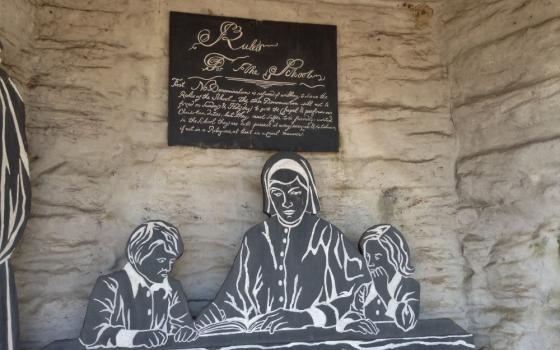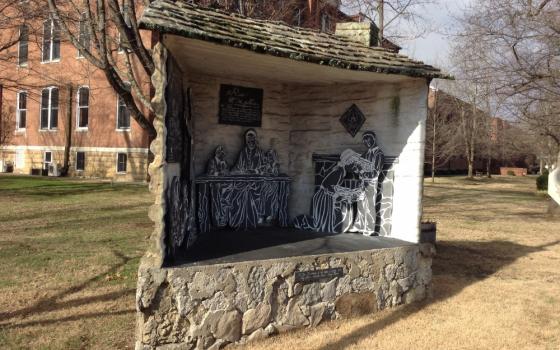As I pray in my hermitage at Cedars of Peace, I am drawn inward, gifted with the present moment and the energy of the surrounding cedar trees, breathing their encouragement. With a deepening sense of integrity I express my thanks to the Sisters of Loretto for providing space where my contemplative spirit can be nurtured.
Sitting in my cabin made of recycled materials, I feel the comfort of sustainability expressed in simplicity. The stones in the wall behind a wood burning stove remind me of the millions of years that evolved and eroded these Kentucky knobs, (isolated, steep, often cone-shaped hills). There is a deep connection with Mother Earth as I reflect on the sisters' spirit of freedom, audacity and risk taking, especially for the poor and marginalized. Their spirit reminds me of the spiral of life dancing in evolutionary twists and turns, choosing to keep what sustains life, and letting go of what is no longer life-giving, building on what has been eroded with time.
My log cabin is a tangible connection with their past. Founded in rural Kentucky in 1812, the Sisters of Loretto were one of the earliest native congregations in the United States. Since good land was scarce in Maryland, in 1785 almost 100 Catholic families decided to settle together on this fertile land where they would be free to practice their religion openly. Today a reminder of this commitment is the 788-acre working farm that is home to the Sisters of Loretto. Their founding women were strong Maryland settlers rooted in American Catholicism, and their inventiveness has a distinctly American flavor.
These Maryland Catholic pioneers were formed in home-based church practice.
As I reflect on the church that John Carroll (first bishop/archbishop of the U.S.) fostered, I sense the openness and experimentalism, and the respect for pluralism that became part of the American landscape. It was out of this American experience of church that three women, each living with relatives in rural Kentucky in 1812, came together to educate the children of their relatives and neighbors. Mary Rhodes, Christina Stuart and Nancy Havern brought with them pioneer determination, practical optimism and a spirit of adventure. Unfortunately, little is known of these founding women since fire destroyed their letters. However, death and hardship united them in community with the families they served, and their spirit lives on.
The Loretto women cherished the guidance of their spiritual director and founder, Fr. Charles Nerinckx. He had escaped persecution in the French Revolution, and on his arrival he was immediately assigned to the Kentucky frontier — where his physical strength and courage were widely admired, though his European piety was often challenged as too harsh.
The first rule of their school read:
No Denomination is refused, if willing to observe the Rules of the School — the other Denomination will not be forced on Sunday and Holyday to go to the chapel and perform our Christian duties, but they must suffer to be friendly: invited in the School they are to be present at every exercise and to behave, if not in a Religious, at least civil manner.
These words greet visitors on the "black board" of a replica of the first classroom, on the grounds of the Loretto motherhouse today.
As the community developed, an emphasis on service and witness became a characteristic of their corporate personality. They were filled with a desire to educate others and created a way of being distinctly American frontier women religious. In their over 200 years of service and witness, they demonstrated educational excellence, leadership in fostering Catholic social justice principles, and a zest for life.
Since 1970, their community has been enriched with the presence and ministry of more than 200 "Co-Members," women and men from various backgrounds and denominations who wish to share the spirit of the Sisters of Loretto, but not as vowed members.
Like many communities, Loretto is currently exploring the transformation of religious life. They have initiated conversations with a variety of people including members of other religious communities, groups of Millennials, and individuals from diverse faith traditions. They are finding that the conversations themselves are meaningful ways of strengthening the bonds of collaboration needed for an emergent future. As they initiate interaction with those seeking a renewed religious life, perhaps dialogue with other pioneers interested in exploring this new "wilderness" will lead to a re-energizing of religious life.
The silent cedars surrounding my hermitage speak to not only their contemplative spirit but also their pioneering spirit. Susan Classen, a Loretto Co-Member, explained:
Cedar trees are native to the Midwest, and are actually "pioneer trees" which are the first to begin growing in areas that have been de-forested. Because they grow in abandoned fields or other areas where conditions are poor, some mistakenly identify them as invasive "weed trees." Their growth, however, creates the conditions necessary for hardwoods to start growing. The area around Cedars of Peace was once clear-cut. First the cedars moved back in, and now the area is transitioning to diverse woodland. As the hardwoods grow, they will shade out the cedar trees, which then die back. These dead cedars were enough for me to build a cordwood cabin.
As I walk the woods and enjoy the autumn beauty of the elm and maple trees, I especially admire the sturdy evergreen cedars, the "pioneer trees" that begin growing first. Here at Cedars of Peace, they simply stand, their green boughs a contrast to the other trees of the forest.
I think these cedars are a powerful image of the Sisters of Loretto: strong, evergreen, resilient, rooted in Earth! They are pioneers surveying the wilderness and planting new seeds of possibility — and like the cedars, earthy, honest, and deliberate. So American in their spirit; so feisty in the expression of their mission. So like the hearty pioneers whose Kentucky roots still bind them to this land! Two hundred years ago, three women teaching in a little log cabin school, truly "catholic" — welcomed all. Yes, they are the Cedars of Nerinx!
[Judith Best is a School Sister of Notre Dame and coordinator of SturdyRoots.org. She gives presentations on the heritage of the School Sisters of Notre Dame and is also exploring evolution as the bridge between science and religion.]


